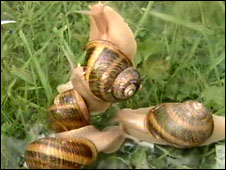business on fast track to success
By Calum Liddle, 20 Nov 2009
theliddlejournalist.co.uk
A young Scottish pioneer has
opened the country’s first
commercial snail farm, in his
parent’s back garden.
Malcolm Stewart, a 17-year-old
from Leith, is successfully
breeding and nurturing common
garden snails as escargot for
some of Edinburgh’s finest
restaurants, and the orders
are filling fast.
Malcolm said: “The snails come from a designated plot in my dad’s back yard before they are treated, cleansed and put into forced hibernation in the kitchen fridge.”
The slimy creatures have proved a hit with the town’s restaurants and Malcolm claims he cannot keep up with the demand for around 300 snails every month.... READ MORE
education 'not green enough'
By Calum Liddle, 06 Nov 2009
theliddlejournalist.co.uk
Children in Scotland are not
prepared for the economic shift
to the environmental sector,
according to industry leaders.
The chief operating officer of
Renewable Energy Systems,
which owns and operates a
growing portfolio of wind farms,
claims Scotland’s schools are
"not up to the job".
Gordon MacDougall criticised the current educational plan adopted by the government, and called for "a more joined up approach to education" so that children "can take advantage of career opportunities in our sector".
He said: "This is a critical issue considering the scale of development needed to meet the 2020 targets and... READ MORE
haud yer wheesht - children
By Calum Liddle, 13 Nov 2009
theliddlejournalist.co.uk
Children are being penalised for
using the Scots language in the
classroom as teachers are
mistaking it as bad English,
according to leading academics.
Scotland’s experts have called
for compulsory in-service
training to be provided to tackle
the “reluctance” of many
English teachers at secondary
level to deal with Scots words.
The EIS, Scotland’s Teaching Union, have previously opposed teaching Scots in secondary schools on the grounds that “not all school children are Scottish”.
Derick McClure, professor of Scots at Aberdeen University said: “I know that some teachers still make the distinction - wrongly interpreted and applied – between what they call ‘good Scots’... and what they call ‘bad English’.
... READ MORE
sheriff: take the help i offer you or face jail
By Calum Liddle
Edinburgh Sheriff Court, 20 Nov 2009.
A MAN has been told to “turn
his life around” in four weeks by
a sheriff, after pleading guilty
to nuisance behaviour and
threatening neighbours in the
Saughton area of Edinburgh.
David Melbourne, 21, of
Stenhouse, had a public
argument with a man after the
sale of his dog fell through.
Melbourne was seen in the area shouting to residents “come and have a go” and threatened to petrol-bomb a flat. Witnesses then saw Melbourne banging on a door in Saughton Mains Terrace shortly after in an “aggressive and highly intimidating manner”, Edinburgh Sheriff Court heard... READ MORE
Coming to a hedge near you: the shear pleasure of topiary
By Calum LiddlePublished in the Scotland on Sunday
IT IS a horticultural art form that has graced the gardens of stately homes for centuries.
Now topiary – the art of clipping trees and shrubs into ornamental sculptures – is spreading from the
great houses of the nation into the urban streets of Scotland.
Caterpillars, bears, dogs,
handbags and trains have all been spotted taking shape outside the nation's homes as gardeners take up the challenge.
Sales of traditional topiary shrubs are also soaring, according to garden centres, as are purchases of special topiary shears used to fashion the eye-catching shrubbery.
Gardening experts said the rise in popularity was due to more people spending longer periods at home because of the credit crunch and a change in garden fashion.
Jim McColl, star of the BBC's Beechgrove Garden, said: "Topiary is certainly becoming more fashionable and popular. The beauty is you don't need a private gardener or a huge landscape to enjoy topiary and it's a lot easier than people would think."
Wire frames are now available to allow first-time topiarists to follow simple designs, McColl said. "The wire nets are available from garden centres for people to give it a try – whether it be a rabbit or a swan. It's all rather amusing and a lot of it is tongue-in-cheek."
Neil Fishlock, head of horticulture at Dobbies Garden Centres, said ornamental topiary shrubs were now a big seller. "We have had a sales increase of 129 per cent on topiary balls and pyramids this year. Sales of topiary shears have also risen by 14 per cent, compared with a year ago.
"The appeal of the clipped box is that it is formal and looks impressive at a front door, while being easy to keep and maintain. All you need to do is buy a pair of shears to keep the topiary bush neatly trimmed all year round, and you have a perfect doorstep plant."
One gardener at the forefront of the topiary craze is Leonora Williamson, who has a bear, dog, pig and a small car decorating her front garden in Inveresk, East Lothian. She saw a picture of a topiary horse and jockey in a magazine and decided to experiment herself. "I was cutting the hedge and just left some lumps which eventually started to take shape," she said. "The bear was intended to be a Buddha but I found it impossible to get the shape right. So I turned him into a bear instead."
In Edinburgh's Morningside, Liz Casciani has also become hooked. "I've just started doing a couple of very basic topiary pieces in the form of spheres," said Liz, who opens her garden to visitors to raise funds for charity.
"I've never actually done it
before, but I can understand
the appeal. They are indeed
very elegant and statesmanlike.
The sharp edges and surface
catch your eye and show the
care and attention that are put
into running a garden."
Peter Wright, who lives in the city's Grange district, is a keen topiarist who has carved a caterpillar in his front garden.
"Boring hedges are for boring people," he said. "My caterpillar really brings a smile to people's faces and the kids, especially, love it."
Most clipped structures are made from common box (Buxus sempervirens), although other suitable species include holly, bay laurel, myrtle, privet and yew. Major garden shows, such as Chelsea Flower Show, have highlighted the growth of topiary over the last two years as gardeners reject the "wild" look in favour of more formal arrangements. Last year, leading garden designer Diarmuid Gavin's garden... READ MORE
families save cash under canvas
By Calum LiddlePublished in the Scotland on Sunday
SCOTLAND is enjoying its biggest boom in camping since Barbara Windsor lost her bikini top in 1969.
Tens of thousands of recession-hit Scots are this summer getting their first taste of holidays under canvas, Scotland on Sunday can reveal.
Bookings for camping and caravan sites across the country are up by between a fifth and a quarter on last year – hitting levels not seen since the simpler and more austere days of the Carry On films.
Some sites have told Scotland on Sunday they are so busy they have to turn away would-be campers.
Even the usually sedate Caravan Club said nearly half of its 27 big sites north of the Border were booked out this weekend and next as occupancy rates soar 21 per cent above their levels for 2008.
Its rival, the Camping and Caravanning Club, yesterday said its Scottish sites were brimming. Spokeswoman Dawn Henton said: "We have seen a boom in camping and caravanning this year, and many people are booking ahead to secure their perfect pitch.
"Forward bookings for Scottish sites have risen by almost 25 per cent since this time in 2008, which equates to over 12,000 bookings."
The club has seen a slightly smaller rise of 16 per cent across the UK, although English and Welsh families tend to take their summer break a month or so later than Scots.
Industry insiders yesterday said that the camping and caravanning sector was being given a huge lift by the floundering pound and ongoing fears of job losses. Holidaymakers are turning their backs on expensive package holidays to the Eurozone in favour of some more basic pleasures much closer to home.
David Richards, who owns the Immervoulin Caravan and Camping Park in Strathyre, near Callander, said his site was up 30 per cent on the year.
He said: "The credit crunch is helping us. Regulars come frequently and we're getting people who haven't been for five or six years. We're also getting a lot of people who we've been recommended to. Many have never camped before. They need somewhere that will look after them.
"We're getting a lot more English people, but it's still 90-odd per cent Scots."
Kath Campbell, co-manager of Braidhaugh Holiday Park in Crieff, which is fully booked at weekends, backed Richards. "We're certainly noticing more new clients," she said. "I'm hearing people saying 'It's all new to me', when booking in. Predominantly it's Scots, but we've had a small rise in foreign bookings too. The weak pound is certainly helping."
Travellers from the continent coming to Scotland now get about 30 per cent more for their Euro than they did last year.
Camping, meanwhile, is becoming the cool way to spend a holiday with major celebrities, like Kate Moss, putting their names to the pastime.
Tents, moreover, are cheap as holiday homes go. It is possible a two-man version can cost less than £10.
Tourism industry leaders, however, remain split over whether a camping boom is good for the economy or not. There are still no figures on occupancy at hotels and holiday cottages and flats. Some tourism chiefs prefer to see big-spending hotel-stayers than penny-counting campers. But the Caravan Club isn't so sure. Its 60,000 Scottish members can have an impressive impact. Over the whole of the UK, caravanners inject an average of £17 million into the economy every year... READ MORE




